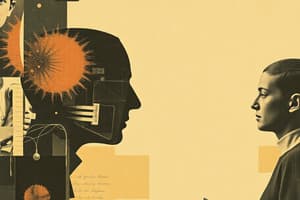Podcast
Questions and Answers
What concept did Alan Turing propose regarding machines and human-like intelligence?
What concept did Alan Turing propose regarding machines and human-like intelligence?
- Machines can only perform calculations with predefined logic.
- Machines should be programmed to mimic human emotions.
- The intelligence of machines is solely based on their physical capabilities.
- If a human cannot distinguish between responses from a machine and a human, the machine can be considered 'intelligent'. (correct)
What is the Church-Turing thesis primarily related to?
What is the Church-Turing thesis primarily related to?
- The notion that digital computers can simulate any formal reasoning process. (correct)
- The ethical implications of artificially created beings.
- The ability of machines to replicate biological processes.
- The physical limitations of computer hardware.
What did McCullouch and Pitts contribute to the field of artificial intelligence?
What did McCullouch and Pitts contribute to the field of artificial intelligence?
- They developed the first neural network model. (correct)
- They designed algorithms for step-by-step logical reasoning.
- They proposed a model for simulating human emotional responses.
- They established the foundations for probabilistic reasoning in AI.
What type of algorithms emerged during the late 1980s and 1990s in AI research?
What type of algorithms emerged during the late 1980s and 1990s in AI research?
Which of the following best describes the term 'combinatorial explosion' in AI?
Which of the following best describes the term 'combinatorial explosion' in AI?
What distinguishes traditional artificial intelligence from computational intelligence?
What distinguishes traditional artificial intelligence from computational intelligence?
Which of the following best describes hybrid intelligent systems?
Which of the following best describes hybrid intelligent systems?
What is a major philosophical debate surrounding artificial intelligence?
What is a major philosophical debate surrounding artificial intelligence?
According to AI scholars, what is considered a 'holy grail' in AI research?
According to AI scholars, what is considered a 'holy grail' in AI research?
Which of the following individuals is known for their skepticism about formal logic in achieving real cognition?
Which of the following individuals is known for their skepticism about formal logic in achieving real cognition?
Flashcards are hidden until you start studying
Study Notes
The History of AI
- The concept of artificial beings has been explored in literature since ancient times.
- Mary Shelley's Frankenstein and Karel Capek's R.U.R. (Rossum's Universal Robots) explored the ethical implications of creating artificial life.
- The study into mechanical, or “formal,” reasoning began with ancient philosophers and mathematicians.
- Alan Turing's theory of computation, based on manipulating simple symbols like "0" and "1", demonstrated a machine's ability to simulate any understandable mathematical reasoning.
- Turing's insights, known as the Church-Turing thesis, showed how digital computers could mimic any formal reasoning processes.
- Scientists began to consider building electronic brains, drawing inspiration from Turing's work alongside discoveries in neurobiology, information theory, and cybernetics.
- Turing proposed that if humans couldn't distinguish a machine's responses from a human's, the machine was considered "intelligent".
- The creation of "artificial neurons" by McCulloch and Pitts in the 1930s is considered the first work in the field of AI.
- Early AI research focused on algorithms simulating humans' step-by-step reasoning when solving puzzles or using logical deduction.
- In the late 1980s and 1990s, AI shifted to processing uncertain or incomplete information, incorporating probability and economics.
- Complex problems require powerful computational capabilities to perform massive calculations, known as "combinatorial explosion," where memory and computation time become immense.
- The primary goal in AI is to find algorithms that solve problems efficiently.
- Humans often use quick and intuitive judgments, rather than the step-by-step deduction that early AI emulated.
- AI has advanced by utilizing problem-solving "embedded symbolic" approaches: acting agents highlighting the importance of sensorimotor skills for higher reasoning.
- Neural network research attempts to model brain structures that create these skills.
- Statistical AI approaches emulate human learning abilities.
AI Schools of Thought
- Traditional AI focuses on methods like machine learning, characterized by formalism and statistical analysis.
- Computational Intelligence emphasizes iterative learning and development, such as adjusting system parameters in connectionist systems.
- Hybrid Intelligent Systems combine both schools of thought, where expert systems’ inference rules might be generated by neural networks or statistical learning.
Key Figures and Contributions
- Alan Turing - Theory of computation, Church-Turing thesis, Turing Test
- John McCarthy - Father of AI, coined the term "artificial intelligence", Dartmouth Conference
- Marvin Minsky - Founder of MIT AI Lab, work on artificial neural networks, cognitive science
- Herbert A. Simon - Nobel Prize in Economics, work on problem-solving, decision making
- John Searle - Philosophy of mind, Chinese room argument
- Douglas Hofstadter - Cognitive scientist, author of Gödel, Escher, Bach, work on consciousness
- Daniel Dennett - Philosopher, author of Consciousness Explained, work on intentional systems
Key Concepts
- Artificial intelligence (AI): Simulating human intelligence in machines
- Strong AI (general AI): AI with human-level intelligence
- Weak AI (narrow AI): AI designed for specific tasks, like chess-playing
- Machine Learning (ML): AI systems learning from data without explicit programming
- Deep Learning : A subfield of ML utilizing artificial neural networks with multiple layers
- Neural Networks : Computer systems modeled after biological neurons, used in AI for pattern recognition and prediction
- Natural Language Processing (NLP): AI that enables computers to understand and generate human language
- Computer Vision : AI that enables computers to "see" and interpret images
- Robotics: Design, construction, operation, and application of robots
- Expert Systems: AI systems that mimic human expertise
- Cognitive Science: Interdisciplinary study of mind and intelligence
- Philosophy of Mind: Philosophical investigation of nature and functions of mind
Open Questions in AI
- The Mind-Body Problem: The philosophical question of the relationship between mind and body (in machines)
- The Chinese Room Argument: A thought experiment questioning whether a computer program can truly understand language
- The Nature of Consciousness: Whether or not AI can attain genuine consciousness
Applications of AI
- Computer Games: AI used to control non-player characters and enhance player experience.
- Medical Diagnosis: AI systems can assist in diagnosis and treatment planning.
- Finance: AI systems can automate trading and risk assessment.
- Transportation: AI systems are used for self-driving cars and traffic optimization.
- Customer Service: AI chatbots provide 24/7 customer support.
- E-commerce: AI systems are used for product recommendations and personalized shopping experiences.
- Education: AI systems can provide personalized learning experiences.
Studying That Suits You
Use AI to generate personalized quizzes and flashcards to suit your learning preferences.




